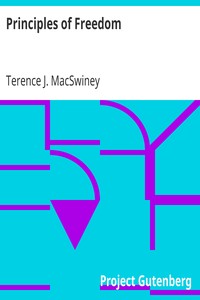Principles of Freedom by Terence J. MacSwiney
"Principles of Freedom" by Terence J. MacSwiney is a political treatise written in the early 20th century. The book articulates MacSwiney’s vision for Ireland’s freedom and independence from British rule, framing the struggle for freedom as both a moral and spiritual imperative. MacSwiney insists that true freedom goes beyond merely seeking political self-determination; it encompasses a higher philosophy of life that includes personal integrity and the unyielding pursuit of justice. At the
start of "Principles of Freedom," MacSwiney outlines the philosophical underpinnings of the fight for Irish independence. He asserts that the desire for freedom originates from a spiritual necessity, emphasizing that Ireland's struggle is not solely for material benefits but for the flourishing of its character and moral integrity. MacSwiney explores themes such as the corrupting influence of tyranny, the importance of moral courage, and the inherent connection between individual virtue and national strength. He lays a foundation for understanding the broader implications of their struggle, indicating that the fight is both for the present and for generations to come, enhancing the urgency and sanctity of their cause. (This is an automatically generated summary.)
Read or download for free
| How to read | Url | Size | |||
|---|---|---|---|---|---|
| Read now! | https://www.gutenberg.org/ebooks/13132.html.images | 296 kB | |||
| EPUB3 (E-readers incl. Send-to-Kindle) | https://www.gutenberg.org/ebooks/13132.epub3.images | 220 kB | |||
| EPUB (older E-readers) | https://www.gutenberg.org/ebooks/13132.epub.images | 221 kB | |||
| EPUB (no images, older E-readers) | https://www.gutenberg.org/ebooks/13132.epub.noimages | 185 kB | |||
| Kindle | https://www.gutenberg.org/ebooks/13132.kf8.images | 391 kB | |||
| older Kindles | https://www.gutenberg.org/ebooks/13132.kindle.images | 371 kB | |||
| Plain Text UTF-8 | https://www.gutenberg.org/ebooks/13132.txt.utf-8 | 285 kB | |||
| Download HTML (zip) | https://www.gutenberg.org/cache/epub/13132/pg13132-h.zip | 212 kB | |||
| There may be more files related to this item. | |||||
Similar Books
About this eBook
| Author | MacSwiney, Terence J. (Terence Joseph), 1879-1920 |
|---|---|
| Title | Principles of Freedom |
| Credits | E-text prepared by Jonathan Ingram, Martin Pettit, and Project Gutenberg Distributed Proofreaders |
| Reading Level | Reading ease score: 62.9 (8th & 9th grade). Neither easy nor difficult to read. |
| Language | English |
| LoC Class | DA: History: General and Eastern Hemisphere: Great Britain, Ireland, Central Europe |
| Subject | Home rule -- Ireland |
| Subject | Irish question |
| Subject | Liberty |
| Category | Text |
| EBook-No. | 13132 |
| Release Date | Aug 7, 2004 |
| Most Recently Updated | Oct 28, 2024 |
| Copyright Status | Public domain in the USA. |
| Downloads | 468 downloads in the last 30 days. |
| Project Gutenberg eBooks are always free! | |

